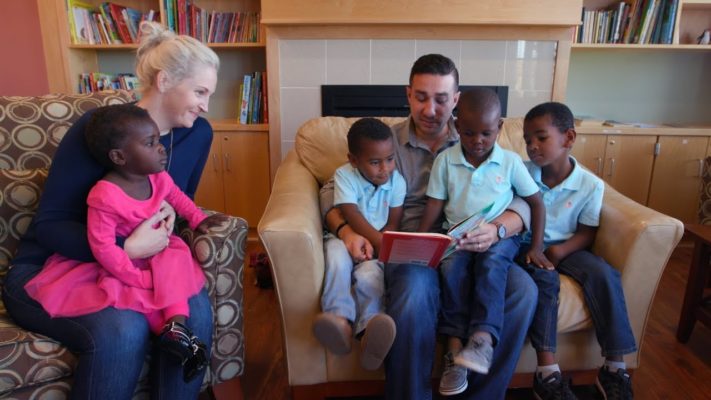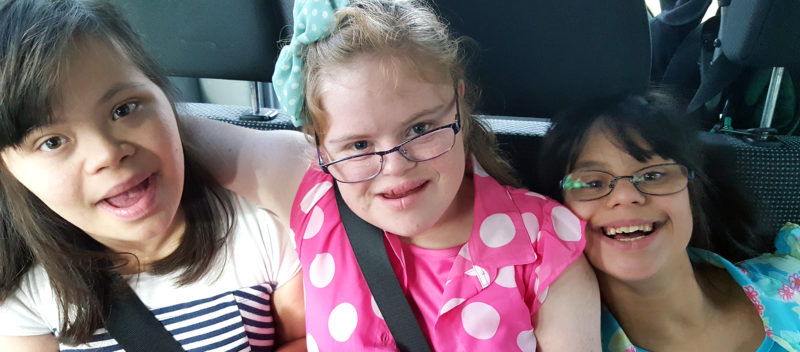One day, no different really from any other work day, I happened to be riding one of the employee shuttles at Cincinnati Children’s with a great guy who was a year behind me in residency. I knew he and his wife had recently brought home a son from Ethiopia after having kids of their own and, looking for something to talk about during a 10-minute ride, I thought to ask him about it.
My husband and I had two biological children and planned on having a third. After my conversation with my colleague that day, I knew I wanted to adopt our third child. I had never considered adoption – let alone international adoption – before that ride, but something about that conversation was life-changing for me.
 At the time our two young daughters were healthy and growing as expected. We had always planned to have another child and once the idea to adopt was planted, my desire to adopt a child from Ethiopia continued to grow with time. Eventually my husband came around to the idea, too. For us, it just made sense. We had so much love and many great things to offer — why not give a home, family and an abundance of opportunities to a child who otherwise would have so few resources available? Our decision was made, we were going to adopt!
At the time our two young daughters were healthy and growing as expected. We had always planned to have another child and once the idea to adopt was planted, my desire to adopt a child from Ethiopia continued to grow with time. Eventually my husband came around to the idea, too. For us, it just made sense. We had so much love and many great things to offer — why not give a home, family and an abundance of opportunities to a child who otherwise would have so few resources available? Our decision was made, we were going to adopt!
Welcoming a child into your family, whether it is by conception or adoption or another means, is an extremely emotional thing. I knew from the beginning that our family would need help and support so we reached out to the International Adoption Center (IAC) at Cincinnati Children’s. The IAC partners with world-renowned specialists to assist adoptive families before, during and after an adoption. Dr. Mary Allen Staat and her team work with parents and their adoption agencies to help ensure each adoption is the right fit for the family as well as the child.
We already knew we wanted to adopt a child from Ethiopia and received confirmation from Dr. Staat that it would likely be a good fit for us. She also helped our family determine things like what age might be best and if we should consider a child with special needs. My husband and I decided we wanted a young boy who would be relatively healthy. Like most parents who are also physicians, I find I am not always objective about my own children’s health, but I knew the IAC would provide unbiased medical expertise – unswayed by emotions – throughout our adoption journey to help us choose the right child to bring into our family.
About a year after we joined the waiting list for a young boy, we finally got “the call” from our adoption agency. They had a referral for a 9-month-old boy with the sweetest little face. A referral basically contains pictures, a medical exam and other information regarding the background of a child who is available for adoption. If you are next on the waiting list, the referral goes to you and then your family has to make a decision: accept the referral and become parents to this specific child, or do the hardest thing you’ll ever have to do as prospective adoptive parents and say, “No,” to a child in need.
Dr. Staat and the team help families evaluate the referral paperwork with a pre-adoption review. Having the support of the team in the IAC can’t make saying “no” any less heartbreaking, but it does give you the reassurance and confidence necessary to deny a referral from an agency if you have any concerns about the child at all.
As soon as I opened our first referral, I did what any endocrinologist would do—I plotted him on a growth chart. Boy was he tiny! Both his height and weight were way below expected for his age and were lower percentiles than what the medical report listed. Although the developmental assessment said he was on track, I wasn’t sure how that could be given his size. Dr. Staat shared our concerns about his size on the pre-adoption consultation. She also noticed something I didn’t in the pictures—his left side seemed to be drawn up compared to the right side. She thought he might have been born premature and, based on his growth parameters and pictures, thought he might have muscle tone issues. Dr. Staat recommended more pictures be sent in order to confirm visually that his tone was good and that he was developmentally on track. Two weeks passed and our agency did not send any more pictures.
After going back over all the information we had in front of us for weeks, my husband and I made the difficult decision to not adopt this little boy. I felt terrible denying the referral. I explained to our social worker at the adoption agency that a specialist in adoption medicine had reviewed his case and we both thought that this child might not be as healthy as it seemed on his medical exam. I will never forget the response we got – the agency didn’t seem to care whether or not the information was accurate.
It was heartbreaking to have no additional information about him, but I am confident that we made the right decision. It is, however, one of the hardest decisions my husband and I have ever had to make. One month after our first referral, we got another referral for a 6-week-old baby boy. He was small, but I felt his medical and developmental assessment seemed realistic and in line with what I expected. We quickly sent the second referral to the IAC and were beyond excited when Dr. Staat told us she thought he would be a great fit for our family. After all we’d been through the first time around, we were so excited to say yes to this child. That little boy became our son, Tate.

As part of the IAC’s services, Dr. Staat also provides travel advice for both the welfare of the child and the health of the parents while in a foreign country. Once you arrive home with your child, the IAC performs a comprehensive post-adoption consultation for your child in order to bring him or her up to speed medically, nutritionally, developmentally and physiologically. When we brought Tate home, Dr. Staat met with him in clinic and, as she predicted, he was very healthy and developmentally typical for his age. Tate is now two years old and thriving.
The international adoption process is complex, but you don’t have to go through it alone. In my opinion, it would have been crazy to approach our adoption without Dr. Staat and the IAC team. If it weren’t for the International Adoption Center, I don’t think we would have had the support we needed to ask the right questions, nor would we have had the confidence necessary to make the right decision for our family.
If you’re beginning the international adoption process – or somewhere in the middle of it – I encourage you to contact the IAC, or another similar program close to home. Having an expert in your corner during your adoption will prove more valuable than you will ever imagine.
Learn more about the International Adoption Center or call 513-636-2877.





Very interesting story ! … If anyone at all have Ethiopian born adopted children and would like to meet Ethiopians in Cincinnati area, you can reach me at abebem@tcd.ie